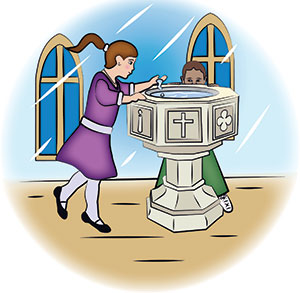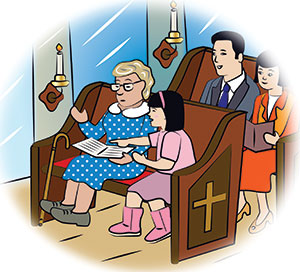Christian parents and caregivers have the difficult and blessed task of raising disciples. When our children are baptized as infants, we profess our belief in their full and complete membership in the body of Christ from the start.
We also promise to teach and model what that means: to “bring them to the word of God and the holy supper, teach them the Lord’s Prayer, the Creed, and the Ten Commandments, place in their hands the holy scriptures, and nurture them in faith and prayer …” (Evangelical Lutheran Worship, page 228).
Secular parenting calls this “being the example.” If you want your child to read, let them see you read; to exercise, let them see you exercise; and so on. The apostle Paul called it imitating Christ (1 Corinthians 11:1). In either case, we know that children learn by imitating the adults in their lives.

Illustration by Fran Lee
As both a pastor and parent, I try to model discipleship. My children (7, 4 and 7 months) sit in the front pew with me every Sunday, not to mention all of the other fellowship and service opportunities that bring us to church. The two older girls know when to sit and stand, how to fold their hands, and they even use fancy church words like “altar” and “hymnal.” They have been communing since they first reached for the bread, and the baby will too. When the bread and wine are lifted, I exclaim, “There’s Jesus!” and my children know he is present in their lives.
But I’m not unique. Most parents, grandparents and godparents who make such baptismal vows really mean them. We tell our children about Jesus, take them to church and teach them to pray. We sing them songs like “Jesus Loves the Little Children” and, at our best, model this faithfulness in our lives.
At the risk of self-congratulation, until recently I felt I’d done a pretty good job teaching my young disciples. Then one morning as I was dressing my then 2-year-old for church, my false confidence came crashing down. My dear child parroted my use of the word “church,” adding with all due severity, “Quiet voice!”
An example of decorum
Somewhere along the way the intended message had been lost. Despite my careful planning and deliberate instructions, my toddler was learning that church was about being quiet rather than about being the body of Christ. And, I’m ashamed to admit, I know how it happened — after all, we are the example.
The sitting and standing, the folded hands and impromptu explanations of the real presence come at a cost. In between this “good” church behavior are whispered lectures, confiscated toys and tottering toddlers on both hips. Sometimes we only make it to the “right” position in time for the last petition of a prayer. And that’s OK because we’re learning.
But from our place in the front, where the children can actually see what’s going on, I’ve also received a fair number of “looks.” After a few well-intentioned reminders about the nursery and cry room when my second child hit the toddler phase, I became self-conscious.
My priorities morphed from my children and I living into our call to discipleship together to not letting them embarrass me. While I steadfastly refused to take my children to the nursery so they could worship, my tone changed. I became quicker to snap. Wary of every stray noise, I began reminding my girls frequently: “Shhh — quiet voice.” And they noticed.
Hearing my refrain in my daughter’s voice led to a double take. The other refrains that punc-tuated our life together matched my expectations. At school I encouraged, “Learn lots!” With friends I exclaimed, “Have fun!” But at church, with the mantra, “Shhh — quiet voice!” I muddied the waters.
Just as surely as school is centered on education, my children were experiencing church as a place that centers on silence and decorum, where they, with their eager voices and wiggly bodies, were more of an imposition than a part.
But Jesus says …
This is a far cry from “Jesus loves the little children.” Nor is it what discipleship is about. Jesus isn’t concerned about decorum. He never hushed his disciples. But Jesus does reproach his disciples when they attempt to prevent a group of little children from approaching him.

Illustration by Fran Lee
Jesus reminds adults that our calling is not simply to teach kingdom behavior to children but to learn it from them too. To allow children to model Christ for us. For “Whoever does not receive the kingdom of God as a little child will never enter it” (Luke 18:17). So what if we listen to Jesus? What if we let our noisy, wiggly children be the example? I gave it a try.
When I listened to my children’s voices rather than silencing them, amid the giggles and chatter I learned that there’s more to worship than looking good to my neighbors or being able to hear the preacher. I learned about community.
A community in which, through bread and wine, Jesus dwells in my toddler’s tummy. A community that inspires my children to want to “share the peace” even with the villains from their toys and TV shows. A community into which my 7-year-old is excited to invite displaced families through our congregation’s new shelter initiative. “Because,” as she reminded me, “every child should have a home.” But most of all, a baptismal community.
So I have a new refrain. These days as we enter worship, instead of pre-emptively shushing my children, I pause with them at the baptismal font, mark a cross on their foreheads and say, “Child of God, you are sealed with the Holy Spirit and marked with the cross of Christ forever.”
And lest I forget, they remind me that I am too.




